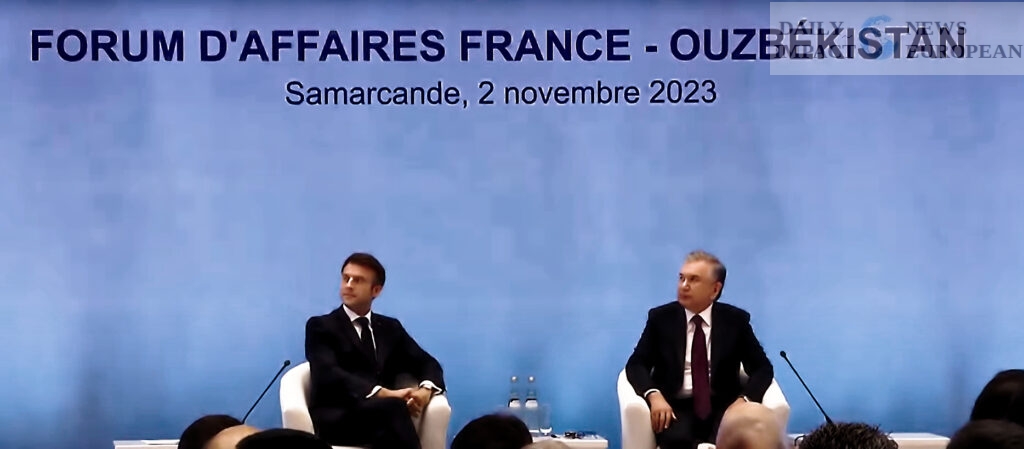After the visit to Mongolia, and the invitation of his counterpart Ukhnaagiin Khürelsükh to Paris, Emmanuel Macron went to Central Asia to establish new collaborations with Kazakhstan and Uzbekistan.
Emmanuel Macron to travel to Uzbekistan. Despite a tense international context, the President landed in Uzbekistan and this Thursday, November 2, is present at the Franco-Uzbek business forum.
While President Emmanuel Macron arrived in Uzbekistan, the French uranium specialist Orano announced this Thursday, November 2, that it had extracted its first 350 kilograms of uranium in the country. This is a symbolic step as part of a pilot project, indicated the French presidency.
Emmanuel Macron promised to support President Chavkat Mirzioyev in his policy of openness
French President Emmanuel Macron promised Thursday to support his Uzbek counterpart Chavkat Mirzioyev in his country’s opening policy, calling for the strengthening of partnership and economic exchanges with this former Soviet republic of Central Asia. “Uzbekistan is transforming. We must be there. We will be there!”, he assured at the opening of a Franco-Uzbek business forum in Samarkand , architectural jewel on the ancient Silk Road.
Emmanuel Macron also praised the “clear policy of appeasement, regional stability, openness and modernization” of the economy of the former Soviet republic.
“For seven years, you have undertaken a clear policy of regional appeasement and stability and the opening and modernization of your economy. We believe in this policy, we support it, we want to encourage it and we want to participate in it,” he said alongside his counterpart. “The French government has confidence in your strategy,” he insisted.
But it must be said that, at a time when China and Turkey are gaining ground in this region hitherto dominated by Russia, Emmanuel Macron’s visit was placed under the aegis of realpolitik. A positioning that paid off, since several agreements were concluded in energy and the modernization of Uzbek infrastructure.
Emmanuel Macron, accompanied by the ministers of Industry, Foreign Trade and around fifteen business leaders including the CEOs of EDF, Suez and Orano, indeed suggested that he would work to strengthen the partnership economic – where France is the fifth foreign investor, ahead of China – and to develop that with Uzbekistan.
The French uranium specialist Orano has announced the first extraction activities in Uzbekistan which it aims to develop. The French electricity giant EDF, for its part, concluded a pre-contract for the realization of two hydroelectric projects and the French group Total Energies a memorandum of understanding for the extension of the Tutly solar power plant.
A hybrid power plant project (solar, wind, battery) was also concluded between Voltalia and the Uzbek Ministry of Energy. Finally, the Egis engineering group was also entrusted with a feasibility study for the tramway in Tashkent, the capital of Uzbekistan.
The French Treasury will grant loans for the supply of drinking water in the Kashkadarya region, by the Eiffage group, while Uzbekistan is a largely desert country. French companies are already very present in the modernization of infrastructure in Tashkent. The French groups Veolia and Suez are well established there with the management of district heating and water sanitation respectively.
Since 2016, the French Development Agency (AFD) has financed projects worth more than 1.3 billion euros in Uzbekistan in urban infrastructure, water management and energy.
President Chavkat Mirzioïev, for his part, explained: « a new era of cooperation is beginning » between the two countries, as well as mutual understanding and trust.
“The reforms are irreversible”, “we will continue our policy of openness”, he said, assuring that he wanted to “build a democratic country”, with a “strong civil society”. “Have confidence, you have the president’s word,” he concluded, promising to create “the best conditions” possible for French companies. The two leaders announced that their two countries would initiate discussions to conclude a strategic partnership by the end of 2023.
The uranium specialist also intends to develop its activities in Kazakhstan, where it already operates a mine, and in Uzbekistan while one of its main suppliers, Niger, is becoming more unpredictable after a coup in July.
Orano also signed, on October 12, an agreement with Mongolia with a view to exploiting a large-scale uranium mine in this vast landlocked country between Russia and China, the Elysée announced on the occasion of the State visit of the Mongolian president to France.
This mine being potentially one of the most important in the world, the project, developed by Badrakh Energy, the joint venture between Orano and the Mongolian public company MonAtomest, is estimated at “more than a billion euros”, had AFP indicated in June, citing a diplomatic source. This project follows the industrial pilot deployed “successfully” by Orano between 2021 and 2022, according to the French group.
Contracts covering strategic minerals – with cooperation in geological research, the production of vaccines against foot and mouth disease and the development of a major wind farm in collaboration with Total Energies have been signed.
Emmanuel Macron followed in the footsteps of François Mitterrand, who was the first European head of state to visit Central Asia, in 1994, three years after the breakup of the USSR. Before leaving for Paris, the Head of State visited several legendary sites in Samarkand, where the warlord Tamerlane had sumptuous buildings built in the 14th century.
Copyright©2023 IMPACT EUROPEAN. All rights reserved.
Views: 0



More Stories
Phenom 300E: The World’s Leading Light Jet for 14 Consecutive Years
Coutures: Angelina Jolie Stuns at the Paris Premiere
Ranking of French Cities by Rental Yield